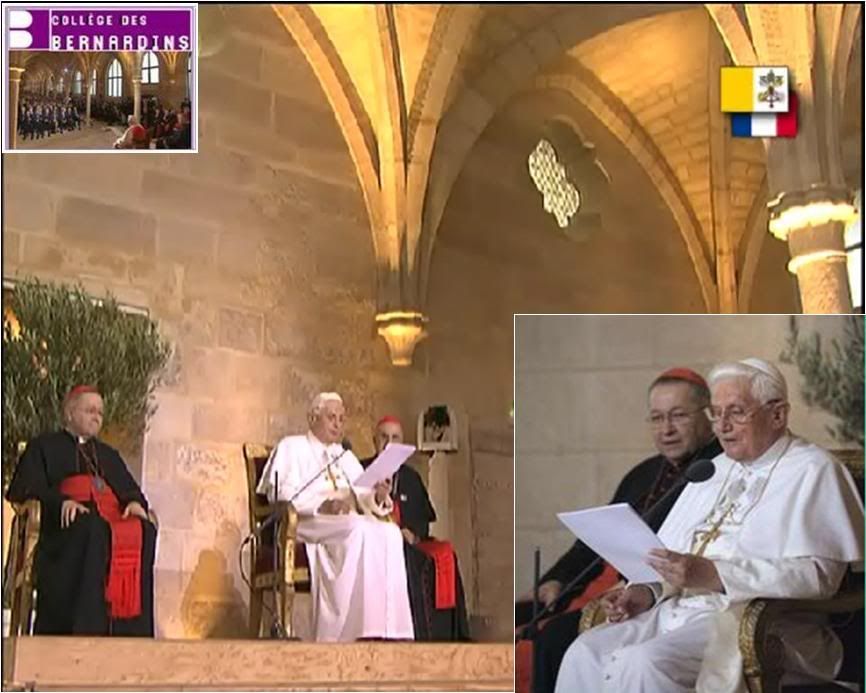 The Pope and his catecheses
The Pope and his catecheses
by Fr. Massimo Camisasca
Translated from

Sept. 7, 2009
Fr. Camisasca, born 1946 and ordained in 1975, has been the Superior-General of Comunione e Liberazione's Fraternity of the Missionaries of San Carlo Borromeo since 1985. Since 1992, he has written at least 22 books on religion, theology and the C&L movement.
Pope Benedict XVI has resumed speaking, during his general audiences, of the history of the Church through its saints and its most important teachers. Last Wednesday, he spoke on St. Odon, the second abbot of Cluny.
I wish to offer some reflections not on the contents, but on the method of these lessons.
It seems to me that the Pope's objective is to allow the historical dimension of truth to shine forth. By showing us how it is born or is discovered and then affirmed in the lives of these exemplary men, he makes us grasp what truth is in a more effective manner that any abstract argumentation.
It is not by chance that the protagonist of the last catechesis
[and so many other catecheses and lectures of Benedict XVI] was medieval monasticism - perhaps the most striking example in human history of what truth has to do with history itself.
Truth is to be found in any life that generates history. And that is what the monks have taught us: how truth gives form to history.
But one must be careful: nothing can be farther from the truth than that religion is an
instrumentum regni, an instrument to rule. Civilian religion
[secularism?], significantly born within the movements of the French Revolution, is the exact opposite of monasticism.
Indeed it was born as the expression of a State, a political power, which wished to put together some common values on which to construct civil coexistence.
An acute plan, certainly astute, but which has nothing to do with the life of St. Odon, say. Again, it is not by chance that it was the very descendants of the Revolution of 1789 who transformed Cluny into a stone cave.
[???? The abbey was sacked and practically destroyed totally during the French Revolution.]
Monks felt they were the objects of a love that 'condemned sin and loved the sinner' - and from this experience, a new civilization was born in time, like ripe fruit from a tree.
They did not live together to cultivate a plan to change the world, but living within the light brought by Christ, they made the world around them flower.
This is really the basic theme even of the Holy Father's last encyclical,
Caritas in veritate.
If we are no longer able to live the experience that generated that passion for man in the medieval monks. we must resign ourselves to imitate or seek to reproduce that love - in which case, the copy would be stillborn.
Monasticism is as far from using faith as an
instrumentum regni, as capitalism is far from appreciating the work of the monastery, nor the 'communism' of the communal life in Cluny, nor the monk's readiness to help the sick man in whom he sees Christ.
Today, the fruits of that life, which marked the birth and development of European civilization, are seen by contemporary men as a provocation.
Admiring, the faithful can see the Spirit in that work and be comforted in his faith. Looking back on it, the non-believer may find his curiosity awakened and take the great step from the fruits to the tree that generated these fruits.
[The conclusion being, from the premise of the article, that this is how last Wednesday's particular catechesis leads the attentive listener to appreciate the truths concretely expressed in the monastic life.

Of course, the definitive lecture on monasticism and the inestimable and incredibly wide-ranging consequences of the monks' humble search for God was Benedict XVI's address to the French world of culture at the College des Bernardins in Paris almost one year ago.]
[Modificato da TERESA BENEDETTA 08/09/2009 02:45]